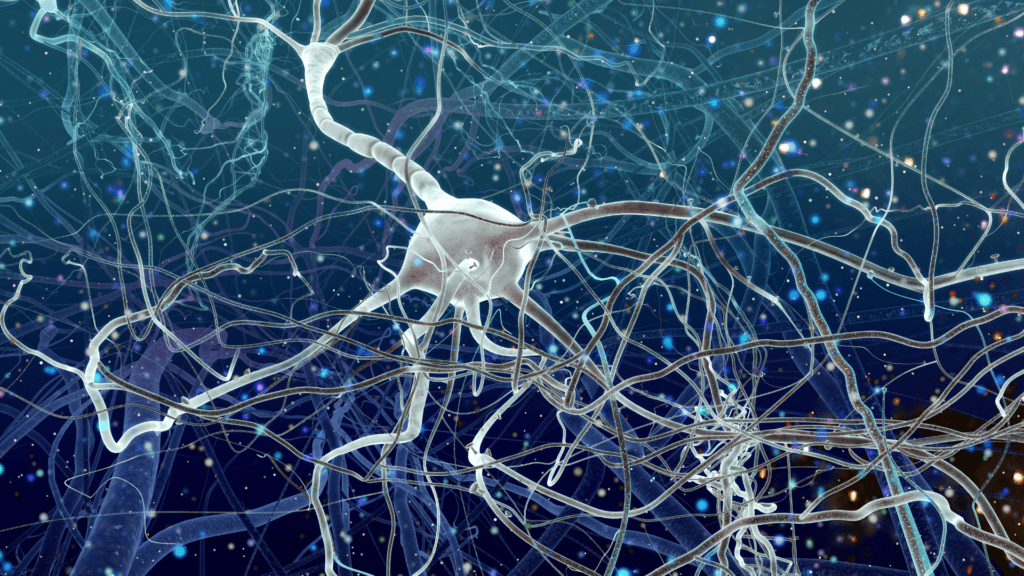🎧 Audio Version
The Driven Mind: Understanding Type A Personality Traits
In the realm of personality psychology, few concepts have captured public imagination quite like the Type A personality. Characterized by ambition, competitiveness, and a relentless drive for success, Common traits of Type A personality include being ambitious, competitive, and driven. But what exactly defines this personality type, and how does it manifest in the brain? Let’s delve into the fascinating world of Type A personality traits, exploring their origins, manifestations, and the neuroscience behind them.
The Genesis of Type A: Brief History
The concept of Type A personality was first introduced in the 1950s by cardiologists Meyer Friedman and Ray Rosenman. They observed that many of their clients with heart disease exhibited similar behavioral patterns, including a constant sense of time urgency, competitiveness, and hostility. This led to the development of the Type A and Type B personality theory, which has since become a cornerstone of personality research.

Defining Characteristics: What Makes Someone Type A?
Type A personality traits encompass a wide range of behaviors and tendencies. Some of the most prominent include:
Ambition and Drive
Type A individuals are often described as highly ambitious and goal-oriented. They set high standards for themselves and others, constantly striving for achievement and success.
Time Urgency
A hallmark of Type A personality is a persistent sense of time pressure. These individuals often feel like they’re racing against the clock, leading to impatience and frustration with delays.
Competitiveness
Type A personalities thrive on competition. They have a strong desire to outperform others and may view many situations as contests to be won.
Perfectionism
The pursuit of perfection is a common trait among Type A individuals. They often have difficulty delegating tasks, preferring to maintain control to ensure everything meets their exacting standards.
Multitasking Tendencies
Type A personalities frequently engage in multiple tasks simultaneously, driven by their desire to maximize productivity and efficiency.

Enhancing Understanding of Type A Personality Through Neuroscientific Methods
Recent advancements in neuroscience have significantly enhanced our understanding of Type A personality traits. By utilizing techniques such as functional MRI (fMRI) and electroencephalography (EEG), researchers can observe brain patterns associated with these traits. These methods reveal heightened activity in areas like the prefrontal cortex, which is linked to decision-making and impulse control, and the amygdala, associated with stress responses. Understanding these neural mechanisms allows for more targeted interventions to help manage the challenges associated with people who have fall under Type A personality.
The Neuroscience of Type A: What’s Happening in the Brain?
Recent advances in neuroscience have shed light on the biological underpinnings of Type A personality traits. While personality is a complex interplay of genetic and environmental factors, certain neural patterns have been associated with Type A characteristics.
The Amygdala and Emotional Reactivity
Research has shown that Type A individuals may have heightened activity in the amygdala, a brain region associated with emotional processing and stress responses. This increased activation could contribute to the heightened stress reactivity often observed in Type A personalities.
Prefrontal Cortex and Executive Function
The prefrontal cortex, responsible for executive functions like planning, decision-making, and impulse control, also plays a role in Type A traits. Studies have found that Type A individuals may have enhanced connectivity between the prefrontal cortex and other brain regions, potentially contributing to their goal-directed behavior and ability to multitask.
Dopamine and Reward Sensitivity
The neurotransmitter dopamine, associated with motivation and reward-seeking behavior, may be particularly influential in Type A personalities. Some research suggests that Type A individuals may have increased sensitivity to dopamine, driving their ambitious and competitive tendencies.

The Double-Edged Sword: Benefits and Challenges of Type A Traits
Type A traits can drive success but also present unique challenges.
Professional Success
Individuals with Type A personality often excel in their careers due to their ambition, efficiency, and strong drive for achievement. Their ability to work under pressure and consistently meet deadlines makes them invaluable in competitive environments, leading to rapid career advancement. These traits often result in leadership roles, where they can maximize their potential in decision-making and strategic execution.
Leadership Potential
With their natural decisiveness and high levels of motivation, many individuals who possess these traits are well-suited for leadership roles. They tend to inspire teams with their high energy, clear vision, and ability to implement strategic goals. Their persistence in the face of challenges makes them influential leaders who can rally others to work toward common objectives. Their resilience and ability to keep pushing forward even in difficult circumstances set them apart as dynamic leaders.
Efficiency and Productivity
Type A personalities are known for their exceptional multitasking abilities and strong time management skills, which contribute to their high productivity. They thrive in structured environments where efficiency is key, often finding ways to streamline processes and enhance overall performance. Whether in personal projects or professional tasks, their disciplined approach ensures that goals are met swiftly and effectively. This ability to stay organized and focused benefits not only their personal lives but also any team or organization they are part of.
High Standards and Attention to Detail
Type A individuals set high standards for themselves and others, often leading to excellence in their work. Their meticulous attention to detail ensures that tasks are done correctly the first time, minimizing errors and increasing overall output quality. This trait makes them reliable in roles where precision is crucial, such as project management, finance, and other detail-oriented fields.
Resilience and Adaptability
Despite their high-stress tendencies, people with Type A traits demonstrate remarkable resilience. They are often quick to adapt to changing circumstances, recalibrating their approach when necessary to meet their goals. This adaptability allows them to thrive in fast-paced environments and overcome obstacles that might stall others. Their ability to maintain focus and determination in the face of pressure enables them to succeed even in the most demanding situations.
Stress and Health Concerns
The relentless drive for achievement in Type A individuals often leads to chronic stress, which can take a significant toll on physical health. This constant pressure is associated with an increased risk of health problems, particularly cardiovascular issues such as high blood pressure and heart disease. Type A personalities are more likely to experience high levels of cortisol (the stress hormone), which, over time, can weaken the immune system and lead to conditions like insomnia, anxiety, and even gastrointestinal issues. Their sense of urgency and perfectionism exacerbates these stressors, making it difficult to relax or unwind.
Interpersonal Difficulties
Type A individuals often have exceptionally high standards—not just for themselves but also for those around them. While these traits can lead to high levels of personal achievement, they may create friction in relationships, both personal and professional. Their competitiveness and impatience with others who do not meet their standards can lead to conflicts, misunderstandings, or feelings of frustration. In team settings, this may cause tension, as they may push others too hard or become critical if they feel performance is lacking. Maintaining healthy relationships often requires learning how to manage these tendencies and understanding that not everyone operates at the same pace or intensity.
Burnout Risk
The relentless pursuit of perfection, a hallmark of Type A personality traits, can result in burnout if not managed properly. This formidable desire to be “perfect”, combined with a fear of failure, makes Type A individuals particularly susceptible to complete emotional shutdown. Burnout manifests as both mental and physical exhaustion, and over time, it can severely impact productivity and overall well-being.
Type A personalities often struggle to slow down or take breaks, which leads to overworking and neglecting self-care. This chronic state of high stress and overexertion eventually depletes their energy reserves, leading to a cycle of fatigue, decreased performance, and frustration. Without proper management, burnout can derail their personal and professional lives, leaving them feeling overwhelmed and ineffective. This affects both mental and physical health, leading to exhaustion and decreased productivity over time.
Difficulty with Relaxation and Work-Life Balance
Type A individuals often find it difficult to disconnect from work or relax, even during downtime. Their minds are constantly racing, filled with to-do lists, future goals, and perfectionist tendencies. As a result, achieving a healthy work-life balance becomes a significant challenge. They may struggle with feelings of guilt or inadequacy when they aren’t being productive, leading to an all-consuming focus on work that leaves little room for rest, hobbies, or quality time with loved ones.
Over time, people with Type A personality traits who cannot maintain a balanced life, ultimately develop strained relationships and have trouble maintaining the closeness that is needed. This can lead to loneliness and isolation which can contribute to both physical and emotional burnout.
Impatience and Irritability
Another challenge for Type A individuals is their tendency toward impatience, particularly when things don’t move as quickly or as efficiently as they would like. This impatience can manifest as irritability, both toward themselves and others, particularly in situations that feel out of their control. They may become easily frustrated by delays, mistakes, or anything that they perceive as a hindrance to their progress. This constant sense of urgency can lead to strained interactions, especially in environments where collaboration and patience are needed.

Nurturing the Type A Brain: Strategies for Balance
For those with Type A traits, finding balance is crucial. Here are some strategies rooted in neuroscience:
Neuroscience-Based Coaching for Type A Personalities
Neuroscience-based coaching provides customized strategies to help all individuals who have Type A personality traits, learn to manage their high-drive traits using cutting-edge brain science. By leveraging insights from neuroimaging, neuroplasticity, and genetic research, this approach helps coaches understand each person’s unique neural profile. Coaches use this data to design tailored interventions aimed at rewiring thought patterns, improving emotional regulation, and reducing stress, all while maintaining peak performance.
With a deep understanding of how the brain responds to stress and motivation, neuroscience-based coaching helps Type A personalities balance ambition with well-being, fostering long-term success without burnout.
For example:
- Targeted Stress Reduction: By identifying specific neural patterns associated with stress, coaches can develop personalized relaxation techniques for their clients with Type A personality Traits.
- Enhanced Decision-Making: Understanding prefrontal cortex activity helps coaches guide clients in improving decision-making skills.
- Emotional Regulation: Techniques that balance amygdala function can aid in managing emotional responses, reducing stress and improving interpersonal relationships.
These personalized approaches empower individuals with Type A personalities to harness their strengths while mitigating potential drawbacks, leading to a more balanced and fulfilling life.
Harnessing the Power of Type A: A Balanced Approach
Type A personality traits, with their blend of drive, ambition, and intensity, represent a powerful force in human behavior. Understanding Type A personality traits can help individuals harness their strengths while mitigating the associated risks and they can learn to harness their strengths while mitigating potential drawbacks. Whether you identify as Type A, think you possess some Type A personality traits, or simply work alongside those who do, appreciating the complexity of this personality type can lead to greater empathy, productivity, and personal growth.
As we continue to unravel the mysteries of the human brain, our understanding of Type A personality traits will undoubtedly deepen. For now, embracing a balanced approach – one that honors the drive and ambition of the Type A mind while nurturing overall well-being – offers the best path forward for those navigating the complex landscape of personality and neuroscience.











